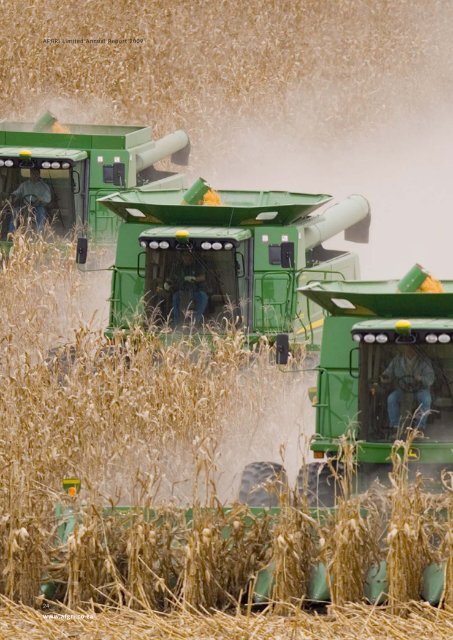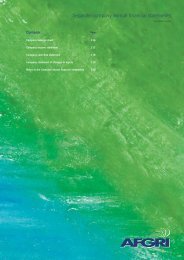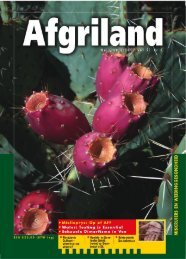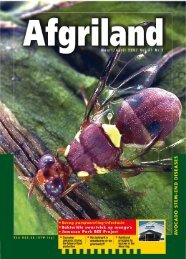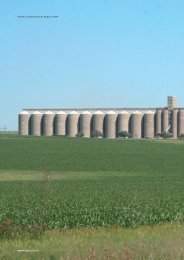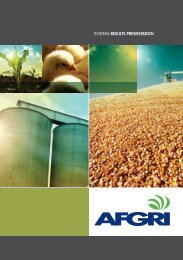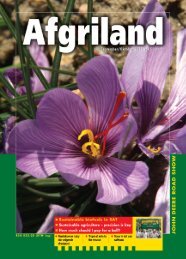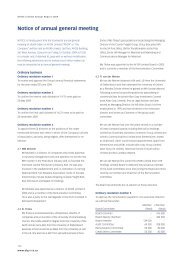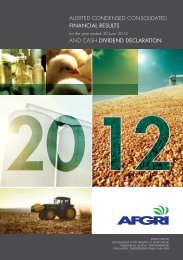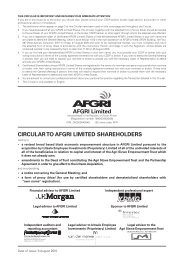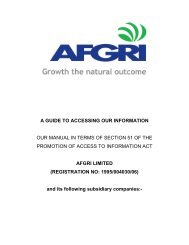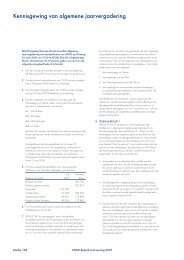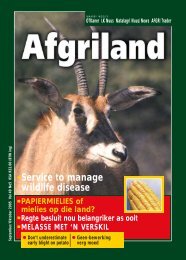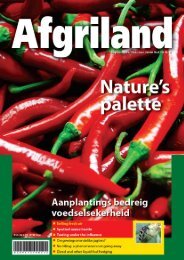Operational and financial review - AFGRI
Operational and financial review - AFGRI
Operational and financial review - AFGRI
You also want an ePaper? Increase the reach of your titles
YUMPU automatically turns print PDFs into web optimized ePapers that Google loves.
<strong>AFGRI</strong> Limited Annual Report 2009<br />
24<br />
www.afgri.co.za
<strong>AFGRI</strong> Limited Annual Report 2009<br />
<strong>AFGRI</strong> is<br />
committed<br />
to the food security<br />
effort in South Africa<br />
<strong>and</strong> Africa<br />
25<br />
www.afgri.co.za
<strong>AFGRI</strong> Limited Annual Report 2009<br />
<strong>Operational</strong> <strong>and</strong> <strong>financial</strong> <strong>review</strong><br />
<strong>AFGRI</strong> produced results for the year<br />
which surpassed those of the<br />
previously reported 16-month period.<br />
Chris Venter, Chief Executive Officer Jan van der Schyff, Financial Director<br />
In a very difficult year for the <strong>financial</strong> services industry <strong>and</strong> an<br />
extensive “clean out” of underperforming assets, strong<br />
performances from the traditional agri-services <strong>and</strong> foods<br />
businesses of <strong>AFGRI</strong> supported by a strong agricultural year <strong>and</strong><br />
some unexpected once-off gains, <strong>AFGRI</strong> produced results for the<br />
year which surpassed those of the previously reported 16-month<br />
period.<br />
Introduction<br />
2008 will be remembered for the worldwide collapse in <strong>financial</strong><br />
markets, governmental support of banks <strong>and</strong> insurance<br />
companies, <strong>and</strong> the “credit crunch”. 2009 saw economic<br />
recession set-in in almost all developed nations. To suggest<br />
that <strong>AFGRI</strong> has not felt the impact of these international<br />
developments would be misleading. However, a good local<br />
agricultural year <strong>and</strong>, until recently, a generally resilient local<br />
economy helped the Group post strong results <strong>and</strong> establish<br />
a secure foundation for 2010.<br />
<strong>AFGRI</strong>’s results have been driven by its traditional agri-services<br />
businesses of grain management <strong>and</strong> the provision of farming<br />
requisites. Continued good results from the Animal Feeds division<br />
negated a difficult year for the broiler investment. The Group’s<br />
<strong>financial</strong> services division experienced a difficult year as a result<br />
of the international <strong>financial</strong> crisis. The severe shortages in<br />
worldwide liquidity in the second half of 2008 arrived during the<br />
summer crop planting season, a time when <strong>AFGRI</strong>’s lending book<br />
grows to its peak levels. The re-pricing of <strong>AFGRI</strong>’s facilities<br />
impacted upon <strong>AFGRI</strong> Financial Services.<br />
The Group revisited its strategy during the year <strong>and</strong> confirmed its<br />
apathy for involvement in the manufacture or production of<br />
primary agricultural inputs. This is the single area of the food <strong>and</strong><br />
agricultural value chain that <strong>AFGRI</strong> does not wish to participate in<br />
due to the high levels of investment that proceed the production<br />
year. As such, sale agreements for the disposal of the loss making<br />
<strong>AFGRI</strong> Seed were concluded during the year, with Competition<br />
Commission approval being received in July. Substantial<br />
negotiations were held with regard to the disposal of the Group’s<br />
agricultural chemical subsidiaries, Tsunami, only to be called off<br />
due to liquidity concerns of the buyer. The Tsunami operation has<br />
performed well during the current year <strong>and</strong> its future will be<br />
re-appraised in the light of recent events.<br />
Strategy<br />
<strong>AFGRI</strong>’s business strategy is to generate sustainable returns for<br />
shareholders by operating throughout the entire food <strong>and</strong><br />
agricultural value chain (excluding the manufacture of primary<br />
inputs). <strong>AFGRI</strong> seeks to capture an ever larger share of the food<br />
<strong>and</strong> agricultural value chain through organic growth in its current<br />
areas of operation, through geographical expansion, especially<br />
into southern <strong>and</strong> eastern Africa, <strong>and</strong> a greater exposure to the<br />
foods sector of the economy, resulting in a more balanced<br />
investment profile across the Group. The Capital division’s<br />
debtors book will be more closely aligned to the elements of the<br />
food <strong>and</strong> agricultural value chain, potentially resulting in a<br />
reduction in the total level of lending. The disposal of the<br />
loss-making <strong>AFGRI</strong> Seed during the current period is consistent<br />
with the Group’s policy of either fixing or exiting underperforming<br />
businesses. The possible disposal of the Tsunami subsidiaries in<br />
the new year will allow the Group to further improve its capital<br />
1972<br />
Silo capacity of the total business was 587 700 metric tons <strong>and</strong><br />
there were silos at Marble Hall, Grootvlei, Kendal, Bloekomspruit,<br />
Nigel, Devon, Val, Ogies, Bethal, Kinross, Leslie, Balfour, Glenroy,<br />
Greylingstad, Middelburg, Driefontein, Arnot, Harvard <strong>and</strong> Holmdene.<br />
1975<br />
OTK’s own cotton ginning mill<br />
at Marble Hall commissioned.<br />
26<br />
www.afgri.co.za
<strong>AFGRI</strong> Limited Annual Report 2009<br />
<strong>AFGRI</strong> capital debtors’ versus total RSA farming debt<br />
R’million<br />
50 000<br />
40 000<br />
30 000<br />
20 000<br />
10 000<br />
0<br />
8% 9%<br />
10%<br />
structure <strong>and</strong> return its focus to its core agricultural services <strong>and</strong><br />
requisites businesses <strong>and</strong> increase its exposure to the foods<br />
sector.<br />
Comparative figures<br />
During the 2008 <strong>financial</strong> year, the Group changed its year-end<br />
from 28 February to 30 June to more closely align its <strong>financial</strong><br />
period with the South African summer crop cycle. Last year, the<br />
Group reported a 16-month period ended 30 June 2008. The<br />
annual <strong>financial</strong> statements included here have been prepared in<br />
terms of International Financial Reporting St<strong>and</strong>ards <strong>and</strong> as such<br />
provide the prior period 16 months as comparatives, in both the<br />
income statement <strong>and</strong> the segmental information. The Group’s<br />
management <strong>review</strong>s <strong>financial</strong> information based on a 12-month<br />
comparable prior period, using consistently prepared<br />
management accounts. The following commentaries on the<br />
results <strong>and</strong> activities of the Group’s operating segments are<br />
based on this management information <strong>and</strong> not the 16-month<br />
comparatives. With the approval of the JSE, this unaudited<br />
management information has been provided to users on<br />
pages 5 to 8.<br />
<strong>AFGRI</strong> Financial Services<br />
This segment includes:<br />
• <strong>AFGRI</strong> Capital, comprising:<br />
11%<br />
2005 2006 2007 2008<br />
RSA <strong>AFGRI</strong><br />
Source: Abstract of agricultural statistics 2009<br />
by department of agriculture<br />
– <strong>AFGRI</strong> Credit, a provider of finance to the agricultural<br />
sector, including producers <strong>and</strong> processors of agricultural<br />
commodities.<br />
– <strong>AFGRI</strong> Insurance Brokers, providing a range of insurance<br />
solutions, from crop to short term, hail <strong>and</strong> input cost<br />
insurance, as well as credit life insurance.<br />
– Africa, representing the Group’s Zambian operations<br />
(excluding the international grain-trading results).<br />
– <strong>AFGRI</strong> Broking, providing SAFEX brokerage services to<br />
clients. It does not engage in any proprietary trading.<br />
<strong>AFGRI</strong> Capital<br />
Being directly exposed to the <strong>financial</strong> sector, <strong>AFGRI</strong> Credit felt<br />
the impact of the world “credit crunch” more severely than any<br />
of the Group’s other divisions. The sudden <strong>and</strong> extensive<br />
limitation on credit, the limited availability of funding under<br />
existing facilities as well as the regular re-pricing of the division’s<br />
underlying facilities required a response involving pro-active<br />
liquidity <strong>and</strong> cash management, reduced marketing <strong>and</strong><br />
ultimately the re-pricing of customers. During 2008 the division<br />
began diversifying its funding <strong>and</strong> was pleased to conclude the<br />
Rabobank securitisation in February this year. This <strong>and</strong> other new<br />
facilities have provided the division with additional debtors’<br />
funding facilities of some R2,25 billion whilst diversifying the<br />
facilities by both price <strong>and</strong> supplier <strong>and</strong> creating a platform to<br />
continue its debtors’ funding strategy. The tenure of the division’s<br />
funding has also been extended through the introduction of<br />
these facilities <strong>and</strong> the renewal of existing facilities.<br />
The division’s interest revenue during the 12 months grew by<br />
some 2%. In a year of generally decreasing interest rates this<br />
growth was driven by a larger average debtors book. Seasonal<br />
contracts with customers delayed the passing on of this<br />
re-pricing by between six to eight months. This <strong>and</strong> the fact that<br />
the entire increased cost of facilities could not be passed on to<br />
customers resulted in a reduction in the division’s gross interest<br />
margin. The re-pricing of facilities was not applied to the cash<br />
collateral deposits provided by <strong>AFGRI</strong> as security. The traditional<br />
benefit of higher gross interest income in a declining interest rate<br />
cycle was surrendered with the introduction of more regular MPC<br />
meetings. The division’s gross interest margin has already begun<br />
to improve following further customer re-pricing.<br />
There has been a clear disconnect between the sharply<br />
deteriorating world economy <strong>and</strong> a very successful local<br />
agricultural season. This has seen farmers invest in new<br />
equipment <strong>and</strong> strengthen their balance sheets. <strong>AFGRI</strong> Credit’s<br />
debtors book remains of a high quality reflected in the bad debt<br />
1980<br />
Grain silo <strong>and</strong> milling business at Leslie<br />
known as E Kagan (Pty) Ltd <strong>and</strong> Kagan<br />
Mills (Pty) Ltd purchased.<br />
1983<br />
New silo with a capacity of 78 000 tons, commenced<br />
at Overvaal, bringing the total bulk h<strong>and</strong>ling capacity<br />
to 2 772 800 tons.<br />
27<br />
www.afgri.co.za
<strong>AFGRI</strong> Limited Annual Report 2009<br />
<strong>Operational</strong> <strong>and</strong> <strong>financial</strong> <strong>review</strong> continued<br />
<strong>AFGRI</strong> sales: customer satisfaction index<br />
(John Deere equipment)<br />
90<br />
50<br />
<strong>AFGRI</strong> Market share:<br />
Tractors & Combine harvestors<br />
%<br />
89<br />
88<br />
87<br />
%<br />
40<br />
30<br />
20<br />
2006<br />
2007<br />
2008<br />
2009<br />
86<br />
10<br />
85<br />
84<br />
2008-2 2008-3 2008-4 2009-1 2009-2<br />
0<br />
Tractors<br />
Combine harvesters<br />
Source: John Deere<br />
Source: John Deere<br />
write-offs 0,3% of the book. The division’s impairment allowance<br />
has been increased by R24,9 million to R124,2 million (2008:<br />
R99,3 million).<br />
Having learnt valuable lessons during the international <strong>financial</strong><br />
crisis, <strong>AFGRI</strong> Credit looks forward to a promising future armed with<br />
the necessary longer term facilities <strong>and</strong> a focused strategy to align<br />
the debtors book with the food <strong>and</strong> agricultural value chain.<br />
highly unregulated <strong>and</strong> volatile environment. After returning to<br />
profitability in 2008, the Zambian subsidiary’s overall result was<br />
satisfactory despite limited liquidity for its Credit division <strong>and</strong><br />
cancelled equipment orders, also due to the availability of credit<br />
in the market.<br />
Overall this segment reported a loss before tax of R9,5 million,<br />
a reversal on last year’s result of a profit of R42,4 million.<br />
The segment’s insurance broking business turned in a very<br />
satisfying year after the inclusion of last year’s acquisitions.<br />
Despite cancellations of short-term personal lines, the strong<br />
agricultural year saw significant increases in crop <strong>and</strong> hail<br />
insurance.<br />
The Group’s Treasury also falls under this segment. This division<br />
manages the Group’s funding lines, the allocation of capital <strong>and</strong><br />
internal interest charges based on working capital utilisation by<br />
individual divisions. Internal interest is charged at the average<br />
cost of Group funding plus a margin to cover operating costs. In<br />
addition, the division charges for specific treasury services such<br />
as arranging forward exchange contracts.<br />
The Group’s expansion into Africa continues with the extension<br />
of its Zambian operation’s involvement in a 30 000 ton storage<br />
facility in the Mkushi farming block <strong>and</strong> its active participation in<br />
regional maize trading (the results of which are included under<br />
the <strong>AFGRI</strong> Trading division). It remains difficult to operate in this<br />
<strong>AFGRI</strong> Broking<br />
<strong>AFGRI</strong> Broking, now reported on separately from <strong>AFGRI</strong> Trading,<br />
saw a significant decline in volumes in line with the lower<br />
volumes traded on the SAFEX exchange. The division remains the<br />
largest trader in SAFEX contracts. Cost-cutting measures limited<br />
the impact of these declining volumes to some extent although<br />
the segment reported a 89% reduction in its profit before tax.<br />
<strong>AFGRI</strong> Producer Services<br />
<strong>AFGRI</strong> Producer Services, being part of the larger <strong>AFGRI</strong> Agri<br />
Services grouping, consists of:<br />
• The Primary Inputs operation supplies fertiliser, chemicals, fuel<br />
<strong>and</strong> seed directly to the farmer <strong>and</strong> includes the Tsunami<br />
agricultural chemical manufacturing subsidiaries.<br />
• The Retail division comprises:<br />
– Retail <strong>and</strong> Equipment, with 58 Town <strong>and</strong> Country retail<br />
outlets <strong>and</strong> five Farm City stores, supplying requisites <strong>and</strong><br />
equipment to farming communities across the country.<br />
1985<br />
Acquired a 40% interest in Earlybird Farms (Pty)<br />
Ltd <strong>and</strong> Earlybird Chicks (Pty) Ltd<br />
Amalgamation of Delmas Kooperasie Limited<br />
<strong>and</strong> Oostelike Transvaalse Kooperasie Limited<br />
1988<br />
Name of Oostelike<br />
Tranvaalse Kooperasie<br />
Limited changed to<br />
OTK (Co-ops) Ltd.<br />
28<br />
www.afgri.co.za
<strong>AFGRI</strong> Limited Annual Report 2009<br />
– Through 11 dedicated mechanisation centres across four<br />
provides <strong>and</strong> supports John Deere self-propelled equipment<br />
<strong>and</strong> implements.<br />
– Partrite, a national supplier of agricultural spare parts.<br />
– T&H Walton Stores, the largest distributor of John Deere<br />
farming equipment in Western Australia.<br />
<strong>AFGRI</strong> Primary Inputs<br />
Despite the large area planted for the 2008/09 summer crop the<br />
Primary Inputs business reported a 12% reduction in revenue.<br />
Anticipated price increases towards the end of 2008 encouraged<br />
early buying. The opposite effect was experienced during the<br />
winter planting season as farmers anticipated price reductions<br />
based on international commodity prices <strong>and</strong> the strong r<strong>and</strong>.<br />
Operating margins in this division improved by 1,4% to 6,3%<br />
increasing operating profits by 14%. A higher interest charge<br />
resulted in this division reporting a 24% decrease in profit before<br />
tax to R37,5 million (2008: R49,3 million).<br />
The sale of the loss-making <strong>AFGRI</strong> Seed, previously housed in this<br />
segment, was successfully negotiated <strong>and</strong> concluded after<br />
year-end. The assets of <strong>AFGRI</strong> Seed are reflected as a disposal<br />
group held-for-sale <strong>and</strong> the results of its operations included<br />
under discontinued operations.<br />
<strong>AFGRI</strong> Retail<br />
Not only did the current year’s strong agricultural performance<br />
of high yields <strong>and</strong> firm commodity prices result in <strong>AFGRI</strong> Retail<br />
stores reporting a very profitable year, but the strengthening<br />
balance sheets of farmers, following two good seasons, saw a<br />
substantial increase in the investment of new equipment such as<br />
tractors, combine harvesters <strong>and</strong> implements. As such, both the<br />
retail <strong>and</strong> equipment aspects of the business performed well.<br />
The division now includes 58 Town <strong>and</strong> Country branches in the<br />
more rural areas served by <strong>AFGRI</strong> <strong>and</strong> five Farm City stores<br />
situated in urban centres. The entire retail network operation<br />
leverages off a cost-effective wholesale operation having a<br />
distribution centre in Bethlehem. The Town <strong>and</strong> Country stores<br />
offer a unique shopping experience for those closely associated<br />
with agriculture <strong>and</strong> the availability of credit in these stores<br />
supports this experience (70% of sales are on credit). Retail sales<br />
at these stores remained resilient during the period despite the<br />
depressed conditions in the rest of the economy. The Farm City<br />
stores experienced a sharp reduction in sales in line with other<br />
retailers in the urban areas.<br />
The full benefits of store rationalisation <strong>and</strong> other cost-focused<br />
initiatives over the past two years was realised for the full year<br />
for the first time. Although the division closed 22 stores in the<br />
prior year as part of a rationalisation programme, revenue grew<br />
by 4% to R2,96 billion (2008: R2,85 billion). The implementation<br />
of a centralised supply chain resulted in an improved product<br />
offering but reduced inventories. This, together with improved<br />
margins through the elimination of non-profitable lines <strong>and</strong><br />
focused management allowed the division to report a<br />
considerable improvement in profits.<br />
Equipment sales throughout the <strong>AFGRI</strong> region grew substantially.<br />
<strong>AFGRI</strong> sold 641 tractors (2008: 497) <strong>and</strong> 48 combine harvesters<br />
(2008: 32) at a market share of 35% (2008: 29%) <strong>and</strong> 44%<br />
(2008: 37%) respectively. These sales are not expected to be<br />
repeated in the new year as equipment sales were already down<br />
35% nationally in June. <strong>AFGRI</strong> is one of the largest John Deere<br />
dealerships in the world <strong>and</strong> the marks reputation for quality,<br />
reliability <strong>and</strong> low running costs have underpinned these sales.<br />
John Deere is also the market leader when it comes to<br />
technology <strong>and</strong> its JD Agricultural Management System is<br />
installed <strong>and</strong> maintained at <strong>AFGRI</strong>’s specialised workshops.<br />
During the trading period, Partrite, a national supplier of<br />
agricultural wear parts, broadened its range to include retail<br />
products that leverage off the existing logistical infrastructure<br />
in Bethlehem with huge success. Dem<strong>and</strong> for parts was<br />
buoyant during the period, due to the aforementioned bumper<br />
maize crop.<br />
The Australian subsidiary produced a good year after many<br />
years of severe drought in Western Australia. As in South Africa,<br />
equipment sales increased over the previous year although many<br />
orders were also cancelled due to the shortage of available<br />
credit. In total, turnover for this operation increased 64% <strong>and</strong> its<br />
contribution to the Group’s profit before tax increased by 203%.<br />
Overall, the Retail division achieved a profit before tax of<br />
R138,1 million, an increase of R106,7 million or 240%. Included in<br />
this increase is a once-off after tax gain of R29,6 million resulting<br />
from the Tobacco transaction more fully described below <strong>and</strong> in<br />
note 5 to the annual <strong>financial</strong> statements. The division’s operating<br />
margin percentage increased to 6,3% from 2,7% in 2008.<br />
1996<br />
Listed on the JSE Securities Exchange.<br />
Largest John Deere agency in the world.<br />
Acquisition of SOK in Eastern Free State with<br />
effect from 1 March.<br />
2000<br />
OTK becomes the first company listed on the JSE<br />
to acquire some of its own issued shares <strong>and</strong><br />
repurchased 4,25%. OTK acquires a SAFEX seat <strong>and</strong><br />
provides a complete hedging solution to clients.<br />
29<br />
www.afgri.co.za
<strong>AFGRI</strong> Limited Annual Report 2009<br />
<strong>Operational</strong> <strong>and</strong> <strong>financial</strong> <strong>review</strong> continued<br />
Yields per ton: RSA vs <strong>AFGRI</strong><br />
8<br />
5000<br />
<strong>AFGRI</strong> silo capacity<br />
Yields per ton<br />
6<br />
4<br />
Thous<strong>and</strong> tons<br />
4000<br />
3000<br />
2000<br />
2<br />
1000<br />
0<br />
2006 2007 2008 2009<br />
RSA<br />
<strong>AFGRI</strong> regions<br />
Source: National crop estimates committee<br />
0<br />
2006 2007 2008 2009<br />
<strong>AFGRI</strong> managed facilities <strong>AFGRI</strong> bunker facilities<br />
<strong>AFGRI</strong> silo facilities<br />
Source: <strong>AFGRI</strong> Logistic Services<br />
<strong>AFGRI</strong> Logistics Services<br />
This segment, being part of the larger <strong>AFGRI</strong> Agri Services<br />
grouping, includes:<br />
• <strong>AFGRI</strong> Logistics comprises:<br />
– The H<strong>and</strong>ling <strong>and</strong> Storage division, having 65 silo complexes<br />
<strong>and</strong> six bunker locations providing in excess of four million<br />
tons of storage countrywide.<br />
– The Logistics division provides third <strong>and</strong> fourth-party logistic<br />
services to the agricultural community <strong>and</strong> allied industries.<br />
• <strong>AFGRI</strong> Trading represents the Group’s commodity trading<br />
activities – the matching of grain production with dem<strong>and</strong> in a<br />
fully hedged environment, trade execution <strong>and</strong> administration,<br />
<strong>and</strong> the Group’s procurement of strategic raw materials. It does<br />
not engage in any proprietary trading.<br />
<strong>AFGRI</strong> Logistics<br />
This is the largest supplier of h<strong>and</strong>ling <strong>and</strong> storage services to<br />
the South African agricultural community <strong>and</strong> represents<br />
approximately 30% of South Africa’s total silo capacity of<br />
14 million tons.<br />
the 2007 opening stock. This increase, together with grain<br />
receipts being more than twice the previous year’s, resulted in an<br />
excellent year for the H<strong>and</strong>ling <strong>and</strong> Storage operation. Turnover<br />
for the H<strong>and</strong>ling <strong>and</strong> Storage <strong>and</strong> Logistic businesses combined<br />
increased by more than 58% over the prior year <strong>and</strong>, although<br />
the average storage period reduced slightly through strong local<br />
dem<strong>and</strong> <strong>and</strong> exports, operating profit improved some 113%.<br />
The freight or logistics division grew its volumes by 21% in a year<br />
in which it made no new investment in vehicles <strong>and</strong> surplus<br />
capacity existed in the total freight market. Again this is an<br />
indication of the disconnect between the South African<br />
agricultural sector <strong>and</strong> the overall economy <strong>and</strong> particularly the<br />
world economy. The surplus capacity did impinge on margins<br />
somewhat.<br />
A reduction in the allocation of Group equity to this segment<br />
resulted in an increased internal interest charge. Overall this<br />
segment improved its overall profit before tax to R138,9 million<br />
(2008: R75,6 million), an increase of 84%.<br />
Higher yields from the hectares planted in the 2008/09, the<br />
summer crop was estimated at 13,2 million tons, of which<br />
11,5 million tons was maize. In the <strong>AFGRI</strong> region an increase in<br />
production of 0,2% was experienced across all grain <strong>and</strong> seed<br />
crops. The opening stock in the <strong>AFGRI</strong> silos on 1 July 2008 of<br />
more than 1,5 million tons represented an increase of 20% over<br />
The business continues to benefit from the use of electronic silo<br />
certificates, strengthening <strong>AFGRI</strong>’s competitive position in the<br />
market. Through the implementation of an electronic grain stock<br />
measuring <strong>and</strong> management silo system, grain stock variances<br />
have all but been eliminated, making <strong>AFGRI</strong> the industry leader in<br />
silo management.<br />
2001<br />
Shareholders urge the re-constitution of the board, in an<br />
effort to encourage OTK to reach its full potential. New<br />
vision to transform OTK from a regionally bound agri<br />
company to a world-class international agri-business.<br />
2002<br />
Debtors’ book with a value of R937 million<br />
sold to banking institutions.<br />
Special dividend of R832 million paid.<br />
30<br />
www.afgri.co.za
<strong>AFGRI</strong> Limited Annual Report 2009<br />
Through the planned investment in bunker facilities at strategic<br />
partnership sites <strong>and</strong> at strategic production locations throughout<br />
southern <strong>and</strong> eastern Africa the business looks to grow its<br />
capacity by 60 000 tons per annum. This physical growth in<br />
capacity will enable <strong>AFGRI</strong> to provide services throughout the<br />
food <strong>and</strong> agricultural value chain. There are early indications that<br />
plantings for the 2009/10 summer crop will be lower than those<br />
of last year because of the recent decline in grain prices.<br />
However, assuming rain is received during the growing months of<br />
January to March <strong>and</strong> further yield improvements are realised,<br />
another good crop can be expected.<br />
<strong>AFGRI</strong> Trading<br />
Previously reported including the <strong>AFGRI</strong> Broking business (now<br />
reported separately), <strong>AFGRI</strong> Trading provides a fundamental<br />
service to the agricultural <strong>and</strong> food sectors of the South African<br />
economy. By forward buying grain production <strong>and</strong> hedging these<br />
purchases on SAFEX <strong>and</strong> also forward selling grain to millers, also<br />
hedging these sales on SAFEX, <strong>AFGRI</strong> Trading is able to act as the<br />
risk-free bridge between the two economic sectors.<br />
<strong>AFGRI</strong> Trading procured some 2,5 million tons <strong>and</strong> marketed<br />
2,7 million tons during the year. Procurement <strong>and</strong> marketing<br />
volumes combined increased by some 124% despite there being<br />
a noticeable reticence in the market due to credit constraints. The<br />
“credit crunch” had less of an impact on stock financing although<br />
<strong>AFGRI</strong> carried stock for longer at a higher cost.<br />
Dem<strong>and</strong> in the regional market has been high with millers<br />
operating at capacity <strong>and</strong> the surplus production volumes being<br />
exported to southern <strong>and</strong> eastern Africa. <strong>AFGRI</strong> Trading exported<br />
some 225 000 tons of maize during the period, approximately<br />
10% of the country’s total export volumes. Despite all the activity<br />
at <strong>AFGRI</strong> Trading, the division reported a reduction in profit before<br />
tax to R12,5 million (2008: R23,8 million). In the main, this decline<br />
in profitability was driven by a mark-to-market gain of<br />
R29,9 million included the prior year results in terms of IFRS.<br />
The recent late rains will boost the winter crop <strong>and</strong> encourage<br />
farmers to plant summer crops. The decline in grain prices has<br />
been balanced by recent reductions in input costs <strong>and</strong> the<br />
prospects are for a good 2009/10 summer crop (weather<br />
excepted).<br />
<strong>AFGRI</strong> Foods<br />
• The Animal Protein division comprises:<br />
– <strong>AFGRI</strong> Animal Feeds, having seven production facilities<br />
throughout the country with a total production capacity of<br />
approximately 1,2 million tons.<br />
– The Daybreak group, a vertically integrated broiler production<br />
<strong>and</strong> processing business having a capacity of 650 000 birds<br />
per week.<br />
– Labworld, a supplier of a wide range of laboratory equipment<br />
used in the agricultural, food <strong>and</strong> beverage, mining <strong>and</strong><br />
petrochemical industries as well as academic institutions.<br />
• The Oil <strong>and</strong> Protein division is comprised of Nedan, a bulk<br />
supplier of edible oils <strong>and</strong> fats, soya <strong>and</strong> cotton protein for<br />
animal feed <strong>and</strong> texturised soya protein for human<br />
consumption.<br />
Animal Protein<br />
The world’s <strong>financial</strong> crisis has been felt throughout the protein<br />
production sector, but especially in the United States <strong>and</strong> Europe<br />
where broiler placements have declined by between 5 – 7%. This<br />
reduction in protein dem<strong>and</strong> <strong>and</strong> the depressed economy (lower<br />
ethanol production) saw commodity prices decline in the second<br />
half of the year. In the United States, the world’s largest poultry<br />
operation (Pilgrim’s Pride) applied for chapter 11 bankruptcy<br />
protection. A reduction in US exports was accommodated by<br />
increased exports from Brazil.<br />
The South African food production chain has similarly seen lower<br />
grain prices <strong>and</strong> input costs in the second half of the year. The<br />
large South African maize crop has resulted in local maize prices<br />
approximating export parity, further limiting input costs. The local<br />
poultry industry has therefore seen improved margins during the<br />
year through an increase in net sales value of approximately 19%.<br />
Whilst average feed prices were 15% higher for the period, they<br />
have declined substantially from their peak in the first six months.<br />
The same cannot be said for the South African dairy industry<br />
which is currently under severe pressure due to the low producer<br />
prices. There has been some improvement through declining feed<br />
prices <strong>and</strong> higher milk prices although the industry continues to<br />
face competition from heavily subsidised imports.<br />
Once again the Animal Feeds made a considerable contribution<br />
to the Group’s results. The division saw a slight (3%) reduction in<br />
volumes as some customers purchased feed based on price<br />
rather than performance. In a declining commodity price market,<br />
2003<br />
Name changed to <strong>AFGRI</strong> – in an effort to move away<br />
from co-operative structure to world class agri-services.<br />
31<br />
www.afgri.co.za
<strong>AFGRI</strong> Limited Annual Report 2009<br />
<strong>Operational</strong> <strong>and</strong> <strong>financial</strong> <strong>review</strong> continued<br />
smaller opposition feed manufacturers are able to buy at spot<br />
<strong>and</strong>, temporarily offer a cheaper product. This is especially true<br />
for poultry feeds. The market for dairy feeds saw a decline as the<br />
customer base itself is under pressure. Invariably these<br />
customers return once the benefit of short-term spot prices<br />
evaporates <strong>and</strong> there is a fuller appreciation of <strong>AFGRI</strong>’s feed<br />
technology resulting in lower costs of production.<br />
Despite this reduction in volumes the division returned a 21%<br />
increase in profit before tax due to a tight focus on maintaining<br />
margins <strong>and</strong> cost control. Margin maintenance was achieved<br />
through a managed procurement strategy, improved formulation<br />
technology <strong>and</strong> developments in the manufacturing process. A<br />
thorough <strong>review</strong> <strong>and</strong> upgrade of the division’s vehicle fleet over<br />
the last two years resulted in transport efficiencies being<br />
achieved.<br />
Tons<br />
300000<br />
240000<br />
180000<br />
120000<br />
60000<br />
Annual poultry imports<br />
0<br />
2002 2003 2004 2005 2006 2007 2008<br />
Annual poultry imports<br />
R/$ exchange rate (average)<br />
Source: Southern African Poultry Association<br />
12<br />
10<br />
8<br />
6<br />
4<br />
2<br />
0<br />
R/$ exchange rate (average)<br />
During the coming year the division expects to complete the<br />
establishment of a new feed mill, having a 60 000 ton capacity in<br />
Pietermaritzburg. Although this is only expected to begin<br />
production in January 2010, distribution of bulk product from the<br />
site will commence well before this date.<br />
Daybreak Farms has been a hive of activity over the past year.<br />
The expansion project increasing weekly capacity to<br />
650 000 birds was commissioned in March. Overall, the year saw<br />
a 10% increase in volumes. Besides the improved NSV, the<br />
operation has contributed to improved <strong>financial</strong> results through<br />
improved on-farm <strong>and</strong> abattoir performances driven by capital<br />
expenditure complementary to the expansion project spend.<br />
Overall the PEF ratio was improved by 31 points (approximately<br />
13%) <strong>and</strong> abattoir yields have improved by 6% since the<br />
completion of the project. These activities allowed the operation<br />
to return to profitability in the current year.<br />
The operation is seeking accreditation by major retail companies<br />
with the intention of broadening its customer base <strong>and</strong> reducing<br />
distribution costs. The operation continues in its attempts to<br />
dispose of certain of its farms to BEE c<strong>and</strong>idates <strong>and</strong> is currently<br />
assisting in the operation of three environmentally controlled<br />
houses in conjunction with the local community <strong>and</strong> the<br />
department of agriculture.<br />
A steady year from the laboratory equipment distributor <strong>and</strong> a<br />
restriction on pure research contributed to the overall segment<br />
result.<br />
Overall, the Animal Protein segment produced a profit before tax<br />
of R153,7 million (2008: R119,8 million), a 28% increase.<br />
Oil <strong>and</strong> Protein<br />
The collapse of soft oil prices during the latter part of 2008 <strong>and</strong> a<br />
softening in the retail environment resulted in pressure on the<br />
margins of the Nedan operation. Conditions have subsequently<br />
improved although the division’s results reflect a difficult year<br />
with a 45% reduction in profit before tax.<br />
In the coming year capital expenditure will be invested at Nedan to<br />
increase the flexibility of the plant to process a wide range of seed.<br />
Discontinued <strong>and</strong> held-for-sale operations<br />
During the year management continued with the Group’s policy<br />
to exit non-core <strong>and</strong> under-performing businesses. Some time<br />
ago a new strategy was adopted for <strong>AFGRI</strong> Seed which included<br />
the development of our own seed cultivars. Although successful<br />
in developing promising strains of seed for the <strong>AFGRI</strong> region the<br />
costs associated with this development, the relatively small size<br />
of the regional market, the non-transferability of these products<br />
to other regions <strong>and</strong> competition from large international<br />
companies meant that this research <strong>and</strong> development strategy<br />
could not be successfully adopted. This realisation has also<br />
contributed to the Group’s refined strategy of inclusion in the<br />
entire food <strong>and</strong> agricultural value chain except for the<br />
manufacture of primary agricultural inputs.<br />
26,77% of <strong>AFGRI</strong> Operations sold to a broad-based<br />
2005<br />
BEE consortium – Agri Sizwe.<br />
Agri Sizwe transaction financed by L<strong>and</strong> Bank<br />
<strong>and</strong> a R361 million special dividend distributed to<br />
shareholders.<br />
2006<br />
Acquisition of 100% of Daybreak<br />
Farms for R120 million.<br />
32<br />
www.afgri.co.za
<strong>AFGRI</strong> Limited Annual Report 2009<br />
The assets of the <strong>AFGRI</strong> Seed were re-valued to fair value during<br />
the first quarter of 2009 <strong>and</strong> following negotiations with a<br />
prospective purchaser transferred to “non-current assets <strong>and</strong><br />
assets of a disposal group held-for-sale”. The negotiations have<br />
now been concluded <strong>and</strong> a sales transaction, at approximately<br />
the fair value, concluded after year-end. The <strong>AFGRI</strong> Seed division<br />
reported an after-tax loss of R61,6 million for the year (2008:<br />
R12,2 million) of which R36,2 million represents losses on the<br />
revaluation to fair value which have been added back for the<br />
purposes of calculating headline earnings per share.<br />
During 2008 a total of four operations were sold or discontinued.<br />
Losses from the finalisation of these sales or closures are also<br />
included in the current year’s discontinued operations. The<br />
additional after-tax loss of R30,8 million arises from the <strong>AFGRI</strong><br />
Farming division (R18,0 million), the Snacks business<br />
(R12,4 million), Citrifruit (R1,3 million), Cotton (R1,9 million),<br />
Deposita (R1,0 million) <strong>and</strong> a R3,8 million profit from the<br />
11 Lowveld retail branches sold subsequent to year-end.<br />
The Financial Services investment in Deposita Systems (Pty)<br />
Limited continues to be classified as “non-current assets <strong>and</strong><br />
assets of a disposal group held-for-sale”. During 2008 a sale<br />
agreement had been drafted but due diligence identified<br />
weaknesses in the internal controls of this associate the sale was<br />
not concluded. The business is currently being restored to a<br />
saleable condition.<br />
Group <strong>financial</strong> results<br />
Profit before tax from continuing operations increased by<br />
R136,4 million or 33% to R552,7 million based on the results<br />
reported for the previous 16 months. The increase in profit from<br />
continuing operations includes certain once-off gains including<br />
the negative goodwill arising on the acquisition of the share of<br />
the tobacco associate (R29,6 million) <strong>and</strong> a R58,6 million gain<br />
arising from the apportionment of the Group’s Pension Fund<br />
surplus. Ignoring these once-off gains, the Group reported a<br />
12% increase in pre-tax profits from continuing operations for<br />
the year when compared to the prior 16-months period.<br />
Despite this much higher tax charge <strong>and</strong> absorbing R92,4 million<br />
in after-tax losses from discontinued operations the Group’s<br />
overall profit for the year increased by 18% to R353,9 million.<br />
<strong>AFGRI</strong>’s earnings attributable to ordinary shareholders grew by<br />
5% to R233 million. The Group achieved earnings per share of<br />
72,7 cents (2008: 69,5 cents).<br />
The 37% (R1,35 billion) significant growth in the Group’s financed<br />
debtors was funded by facilities raised for this specific purpose.<br />
The cash generated from operating activities of R875 million has<br />
been applied to capital expenditure (R384,5 million), cash<br />
collateral deposits to support growth in the debtors book<br />
(R43,8 million), distributions to shareholders (R88,9 million) <strong>and</strong><br />
the Agri Sizwe partners (R84,9 million), <strong>and</strong> an overall increase in<br />
cash <strong>and</strong> cash equivalent balances of R227,1 million.<br />
Prospects<br />
The difficult global economic conditions have impacted on the<br />
Group’s lending margins <strong>and</strong> limited the planned growth in its<br />
debtors book. This has been countered by a strong agricultural<br />
year in South Africa. The Group’s management continues to<br />
aggressively control working capital <strong>and</strong> cash flows, <strong>and</strong> has<br />
adopted an extensive cost control programme. A Group strategy<br />
<strong>review</strong> has resulted in a clearer focus <strong>and</strong> the discontinuance of<br />
underperforming business units has now come to an end. The<br />
Financial Services division has seen off the worst of the “credit<br />
crunch” <strong>and</strong>, with lessons learnt, emerged a more focused<br />
business than before. A further deterioration in the South African<br />
economy may impact the Foods division. The recently lower grain<br />
prices may result in a reduction in the area to be planted for the<br />
summer season, impacting upon the Producer Services division.<br />
The current year’s large crop will support the Logistic division’s<br />
results through the forthcoming <strong>financial</strong> year.<br />
This improved performance did not fully flow through to profit<br />
after tax due to a 167% increase in the average tax rate. A current<br />
year STC charge of R13 million <strong>and</strong> the raising of a R23 million<br />
deferred tax asset in the previous year were the main reasons for<br />
the increase in the tax charge.<br />
Chris Venter<br />
Chief Executive Officer<br />
1 September 2009<br />
Jan van der Schyff<br />
Financial Director<br />
Record maize crop in <strong>AFGRI</strong> regions.<br />
2008<br />
Debtors book grows to R4,6 billion.<br />
2009<br />
Daybreak exp<strong>and</strong>s to 650 000 birds per week.<br />
Loss making <strong>AFGRI</strong> seed disposed of.<br />
Trade receivable facilities increased by<br />
R2,25 billion.<br />
33<br />
www.afgri.co.za


